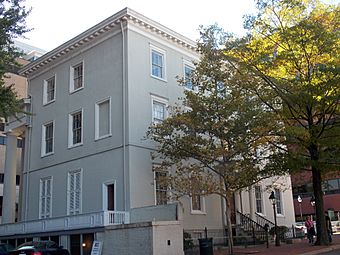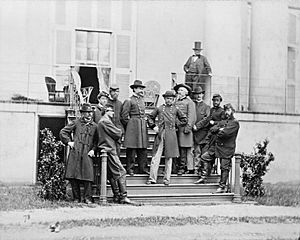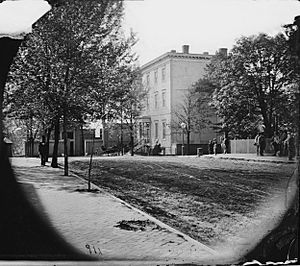White House of the Confederacy facts for kids
|
Second White House of the Confederacy
|
|

The Second White House of the Confederacy in Richmond, Virginia, 2015
|
|
| Location | Clay and 12th Sts., Richmond, Virginia, U.S. |
|---|---|
| Built | 1818 |
| Architect | attributed to Robert Mills |
| Architectural style | Neoclassical (1818 construction); Greek Revival (1844 modifications); Italianate (1857 additions) |
| NRHP reference No. | 66000924 |
Quick facts for kids Significant dates |
|
| Added to NRHP | October 15, 1966 |
| Designated NHL | December 19, 1960 |
The Second White House of the Confederacy is a famous old house in Richmond, Virginia. It was built in 1818 and became the home of Jefferson Davis. He was the only President of the Confederate States of America during the American Civil War.
President Davis and his family lived here from August 1861 to April 1865. Today, the house is on the campus of Virginia Commonwealth University. It is also part of the American Civil War Museum. This historic house was named a National Historic Landmark in 1960.
Contents
The House's Early Days
This grand house was built in 1818. It was designed in a style called Neoclassical, which means it looked like ancient Greek and Roman buildings. A man named John Brockenbrough, who was a bank president, had it built.
The house was located in a fancy neighborhood in Richmond. It was close to important people like U.S. Chief Justice John Marshall. Over the years, other wealthy families owned the house. Before the Civil War, a man named Lewis Dabney Crenshaw bought it. He added a third floor to the building. Later, he sold the house to the City of Richmond.
President Davis and His Family Move In
In May 1861, Richmond became the capital of the Confederate States. President Jefferson Davis and his family moved from Montgomery, Alabama, to this house in Richmond. The Confederate government rented it from the city.
The Davis family was quite young when they lived there. It included President Davis, his wife Varina, and their children: six-year-old Margaret, four-year-old Jefferson Davis, Jr., and two-year-old Joseph. Two more children, William and Varina Anne ("Winnie"), were born in the house. Sadly, one of their young sons, Joseph, passed away during their time there.
President Davis often had health problems. Because of this, he had an office on the second floor of the house. His personal secretary, Colonel Burton Harrison, also lived there. This was a common practice for leaders at the time.
President Lincoln's Visit
On April 2, 1865, the Davis family left the house as Richmond was evacuated. Just hours later, Union soldiers took control of the city. President Abraham Lincoln visited the captured city. He toured the first floor of Davis's former home for about three hours. He felt it was not right to go upstairs into the private family areas.
Admiral David Dixon Porter was with President Lincoln during his visit. They met with local leaders in the house.
After the Civil War

After the war, during a time called Reconstruction, the house was used by the military. It served as the main office for the military district that included Virginia. Important generals like Edward O.C. Ord and Alfred Terry worked there.
When Reconstruction ended in Virginia in 1870, the city of Richmond got the house back. It was then used as Richmond Central School, one of the first public schools in the city after the war.
Becoming a Museum
In 1890, the city planned to tear down the house to build a new school. But a group called the Confederate Memorial Literary Society was formed to save it. They raised money to create a museum.
The society bought the house from the city. In 1896, it opened to the public as the Confederate Museum. This is when people started calling it the "White House of the Confederacy." The house was recognized as a National Historic Landmark in 1966.
Bringing the House Back to Life
From 1976 to 1988, the museum worked to restore the mansion. They wanted it to look exactly as it did during the Civil War. This included the outside and the first and second floors inside.
The restoration was praised for its careful work and for finding many original pieces of furniture. In June 1988, the historic house reopened for public tours.
Visiting Today
Today, the house is still open for public tours. It is an important part of the American Civil War Museum. Visitors can learn about the Civil War and what life was like for the Davis family.
See also
 | Calvin Brent |
 | Walter T. Bailey |
 | Martha Cassell Thompson |
 | Alberta Jeannette Cassell |




